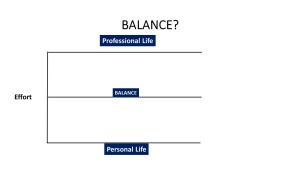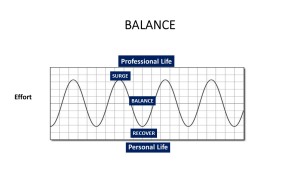A Critical Doer understands time
Remember the first time you went to the circus? If you’re like most, the high wire act was the most captivating thing you saw. It dangerous…exciting…full of energy…and the key to it all was a state of equilibrium called “balance.” Believe it or not, the same can be said of your career, business, or family life. The concept of balance is incredibly simple, but extraordinarily difficult to achieve. It also limits your capacity for doing…let’s take a look at why, and some actions you can take to achieve balance.
The following graphic depicts the average person’s perception of a balanced life.
Normally when we think of balance, we imagine a straight line with an equal level of effort applied to our professional and personal lives. This is great in theory, but it simply doesn’t work that way in the practical world. This graphic more accurately depicts balance:
When you’re starting a new career or a new business, the establishment process takes a lot of focused attention. If you’re rolling out a new product or have an important project that could be a game changer, it drives a significant level of effort.
The level of effort I just described is commonly referred to as a surge. To achieve anything significant, there are times when we have to surge. Most people understand surging and are willing to do it, but the tricky part, unless you’re a critical doer who understands time, is how to come out of a surge.
A surge is a pace that can’t be sustained for the long haul. When you’ve accomplished the goal of a surge, there are two choices…call that level of effort the “new normal” or make a choice to recover. If you don’t understand time, it’s tempting to redefine a normal pace…and it’s a choice that will ultimately undermine progress personally and organizationally. Without a period where people can reestablish proportion between time spent earning a living and time spent on things that give life special meaning, effectiveness diminishes to the point of detriment both professionally and personally.
Here are some tips that you should consider to drive balance as you deal with the ongoing tug between level of effort given to personal and professional lives.
- Communication is your lifeline. At work or home, people can generally deal with anything if they can see it coming. Be open and transparent in order to manage expectations; it’s critical in surviving the demands of the practical world.
- Plan for work and recovery. There is an old saying that “failing to plan is planning to fail.” We all get that when it comes to work; most don’t get it when it comes to recovery. If you don’t plan to recover from a surge as meticulously as you planned the surge, you will never recover and the pace will eventually consume you.
- Establish priorities and honor them. Your priorities should include professional and personal priorities. Your priorities are your moral compass that guide your decisions as you fight the ongoing struggle for balance in the arena of time.
- Adopt a fighter’s mentality regarding your time. This is especially applicable to your family…they need to see you fight for time with them as hard as they see you fight for professional success. Business is fleeting, family is forever…don’t lose perspective.
Critical doers, here’s your challenge as you walk the high wire trying to balance your professional and personal lives. First of all, don’t lose hope if you’re feeling out of balance…it’s perfectly normal, and there are times when it becomes necessary but there is a way back. If you do a good job of managing expectations and stay true to your word, your capacity to do grows exponentially. Communicate, plan, prioritize, and fight your way to achieving a lot of critical doing for the long haul. It’s what a critical doer would…do!
Reminder: you can get automatic updates from The Critical Doer by using the subscription widget at the bottom of this post. You can also follow on Facebook, Twitter, and Google+. I also encourage you to let me know what you think of the posts or share a story of your own using the comments section or email me directly at [email protected].


“Adopt a fighter’s mentality regarding your time. This is especially applicable to your family…they need to see you fight for time with them as hard as they see you fight for professional success. Business is fleeting, family is forever…don’t lose perspective.”
So true. How many times have you seen somebody on their death bed say, “Gee, I sure wish I’d spent more time at work”.